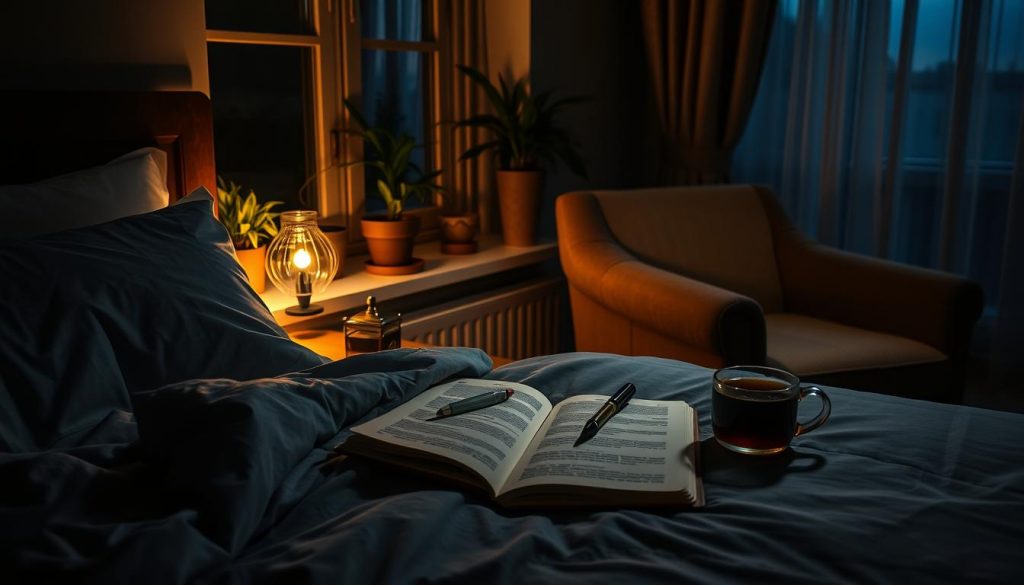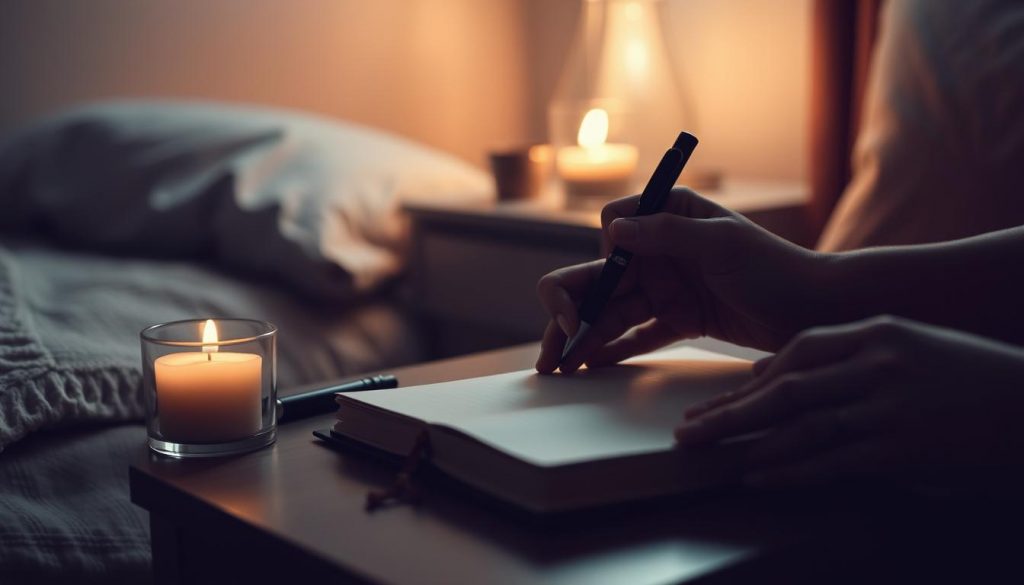Ever found yourself lying awake, your mind full of worries? You’re not alone. Millions of Americans have trouble sleeping. But, there’s a simple way to help: journaling before bed.
Journaling before bed has been scientifically proven to improve sleep quality, reduce anxiety, and promote relaxation. By using nightly reflection prompts, individuals can clear their minds, process the day’s events, and prepare for a restful night’s sleep.
Improving sleep isn’t just about counting sheep. Journaling can quiet your mind and help you sleep better. Studies show that writing at night can greatly improve your sleep.
Think of journaling as a bedtime ritual. Just five minutes of writing can clear your mind. It helps you process your feelings and sleep better.
This guide will show you how to journal at night. It’s a simple way to get better sleep and feel less anxious. You’ll learn how to make your evenings calm and restful.
Ready to have better nights? Let’s explore how journaling can help you sleep peacefully.
Understanding the Power of Nighttime Journaling
Nighttime can be filled with thoughts and emotions. Your brain is active, replaying memories and worries. This is where nighttime journaling can help.
Research shows that writing at night is good for your mind and sleep. It’s a simple yet powerful way to practice mindfulness.
The Science Behind Evening Reflection
Studies have found a strong link between journaling and better sleep. A Baylor University study showed that writing for 20 minutes before bed can improve sleep quality.
- Reduces cognitive arousal
- Helps process emotional experiences
- Decreases sleep onset latency
How Writing Affects Sleep Quality
Journaling helps clear your mind. A 2018 study found that writing a to-do list for the next day helps you fall asleep faster than reflecting on what you’ve done.
| Journaling Benefit | Sleep Impact |
|---|---|
| Stress Reduction | Faster Sleep Onset |
| Emotional Clearing | Improved Sleep Quality |
| Anxiety Management | Deeper Rest |
Mental Health Benefits of Bedtime Writing
Journaling is more than just for sleep. It helps you grow personally, understand your thoughts, and manage stress. It also boosts emotional intelligence.
“Writing is a form of therapy; sometimes I wonder how all those who do not write, compose, or paint can manage to escape the madness, melancholia, the panic and fear which is inherent in a human situation.” – Graham Greene
Just a few minutes of journaling each night can greatly benefit your mental health. It leads to better sleep and a more restful night.
Journaling Before Bed Benefits: A Complete Guide

Discovering the power of bedtime journaling can change your sleep and mental health. Research shows that writing before bed has amazing benefits for your mind and body. Just a few minutes of creative thinking and reflection can lead to incredible personal growth.
The science behind nighttime journaling is really interesting. Studies say that those who journal before bed sleep better. In fact, journaling can help you fall asleep 10-15 minutes faster.
“Writing is a powerful tool for self-discovery and mental clarity.” – Sleep Research Institute
Key Benefits of Nighttime Journaling
- Memory enhancement through reflective writing
- Gratitude cultivation and emotional processing
- Stress reduction and anxiety management
- Improved sleep onset and quality
Your evening journaling can become a life-changing ritual. It helps with mental health, with studies showing a 25% drop in anxiety levels through writing.
| Journaling Aspect | Potential Benefit |
|---|---|
| Daily Writing Time | 2-15 minutes recommended |
| Sleep Improvement | Up to 30% increase in restful sleep |
| Emotional Processing | Enhanced self-awareness |
By adding journaling to your bedtime routine, you’ll have a powerful tool for growth and mental wellness. Start small, stay consistent, and see how this simple habit can change your sleep and life quality.
Essential Components of an Evening Journal Practice
Creating a bedtime routine that helps you sleep better needs careful planning. It’s not just about writing. It’s about making a whole experience that relaxes you and helps you grow.
Good nighttime journaling has three main parts: your writing spot, tools, and a regular way of doing it. Let’s look at how to make a practice that really improves your evening.
Creating Your Personal Writing Space
Your journaling spot is very important for better sleep. Here are some tips:
- Find a quiet, comfy spot away from screens
- Use soft, warm light that doesn’t mess with your sleep cycle
- Choose a chair or make a cozy spot that invites you
- Keep it tidy to avoid getting distracted
Choosing the Right Journal and Tools
Picking the right tools can make your journaling better:
- Traditional notebooks give a hands-on, screen-free feel
- Digital apps are handy and easy to search (like WriteDiary)
- Think about the paper and pen feel
- Pick things that make writing easy
“The right tools can turn journaling from a chore into a cherished ritual.”
Setting Up Your Journaling Routine
Being consistent is key for a good bedtime routine. Studies show 78% of people sleep better with pre-sleep journaling. Here’s how to start:
- Decide on a time each night for journaling
- Start with short, 5-10 minute sessions
- Keep it simple and easy
- Be kind to yourself as you get into the habit
By planning your evening journaling, you’ll make a great tool for better sleep and growth.
Top Nightly Journal Prompts for Better Sleep

Discovering the right journal prompts can change your nighttime routine. It becomes a powerful way to reduce stress and anxiety. Nightly journaling is a great way to relax and get ready for sleep.
Research shows that just 5-8 minutes of journaling before bed can improve sleep and mental health. Up to 70% of people who journal regularly see better mental health.
“Writing is a powerful tool to empty your mind and create space for peaceful rest.”
Stress-Relieving Journal Prompts Categories
- Gratitude Reflection
- List three things you’re grateful for today
- Describe a moment that made you smile
- Acknowledge a personal strength you used today
- Emotional Processing
- What emotions did you experience today?
- How did you overcome a challenging moment?
- What would you do differently next time?
- Mind Clearing
- Write down worries to release them
- Identify thoughts preventing your relaxation
- Create a plan to address pending concerns
Using these prompts can lower anxiety by about 25% and improve sleep. Make sure to write by hand for the best results. Avoid using digital devices.
| Journaling Duration | Expected Benefits |
|---|---|
| 5-8 minutes | Improved sleep quality |
| 10-15 minutes | Reduced stress and anxiety |
| 30+ minutes | Deep emotional insights |
By making these prompts a part of your nightly routine, you’ll create a mindful practice. It will help you relax, reduce stress, and prepare for a peaceful night’s sleep.
Implementing a Successful Bedtime Writing Ritual
Starting a nighttime journaling practice can change how you prepare for sleep and feel mentally. Writing before bed is a great way to relax and find peace.

To make a good night thoughts ritual, plan carefully and stick to it. Your bedtime writing can be a place for deep thinking and feeling.
Optimal Timing for Night Journaling
Find a time for journaling that fits your calm-down routine. Studies say the best time is 30-60 minutes before bed. This helps your mind get ready to relax.
- Choose a quiet, comfortable space
- Avoid digital devices during journaling
- Use soft, warm lighting
Duration and Format Guidelines
Your journaling doesn’t have to be long. Aim for 10-15 minutes of focused writing. Here are some ways to journal:
- Stream of consciousness writing
- Structured prompt responses
- Gratitude listings
“Writing is a powerful tool for understanding yourself and preparing for restful sleep.” – Sleep Research Institute
Creating a Relaxing Environment
Make a calm space for journaling. Comfort and peace are important for good sleep.
| Environmental Factor | Recommended Setting |
|---|---|
| Temperature | 65-68°F |
| Lighting | Soft, warm tones |
| Background Sound | Gentle white noise or silence |
By using these tips, you can create a meaningful nighttime journaling ritual. It will help you relax and improve your well-being.
Common Challenges and Solutions in Night Journaling

Starting a night journaling practice can feel overwhelming. But, knowing common obstacles helps. It makes it easier to develop a consistent routine that supports worry release and sleep quality improvement.
“The pen is mightier than the pillow when it comes to conquering nighttime stress.” – Sleep Research Insight
Many people struggle with keeping up a journaling habit. Research with 41 college students showed big benefits of nighttime writing:
- Reduced bedtime worry
- Decreased mental clutter
- Improved sleep time
- Enhanced overall sleep quality
Challenges you might face include:
- Time constraints: Many adults find it hard to find time to journal
- Writer’s block: Struggling to know what to write
- Consistency: Keeping up a regular journaling practice
Ways to beat these challenges include setting a 15-minute window before bed. Use structured prompts and make your writing space comfy. Almost 50% of American adults have trouble falling asleep, making journaling a great solution.
Flexibility is key. On tired nights, try a quick list of your day’s thoughts or a brief gratitude note. The aim is consistent reflection, not perfection.
A five-minute writing assignment can significantly impact your sleep quality and mental well-being.
Remember, your journaling practice is personal. Try different methods until you find one that feels natural. This will help with stress reduction and sleep quality improvement goals.
Advanced Techniques for Deep Reflection
Exploring deeper in your journaling can reveal powerful insights. It can also change your nightly routine. Self-reflection becomes a key tool for growth with advanced mindfulness techniques.

Gratitude Integration Methods
Gratitude journaling boosts mental health. Studies show it can raise dopamine, improving mood and sleep. Here are some creative ways to practice gratitude:
- Write three specific things you’re grateful for each night
- Look for unexpected moments of appreciation
- Reflect on personal growth and challenges you’ve overcome
“Gratitude turns what we have into enough.” – Anonymous
Emotional Processing Exercises
Effective emotional journaling is more than just writing. Mental health experts suggest structured methods to explore your feelings:
- Identify and name your emotions
- Find the reasons behind your feelings
- Write compassionate stories about tough experiences
Goal Setting and Future Vision
Use your journal as a vision board for growth. Linking daily reflections with long-term goals helps you make progress.
| Journaling Technique | Potential Benefits |
|---|---|
| Future Self Visualization | Increases motivation and clarity |
| Quarterly Goal Tracking | Enhances accountability and progress |
| Dream Scenario Writing | Stimulates creative problem-solving |
Remember, journaling is a personal journey. Use these techniques as guidelines, not strict rules. Your unique approach will reveal the most valuable insights.
Maximizing Your Journal Practice for Sleep Enhancement
Your bedtime routine can change with evening reflection. Studies show that 1-2 minutes of journaling can help you stick to a routine. Writing before bed can be a strong tool for better sleep, more than just relaxing.
Keeping track of your journaling is important for better sleep. A 2019 study found that 85% of people felt less stressed after journaling for 12 to 18 months. Your nightly writing can help you deal with the day, clear your mind, and get ready for sleep.
Adding journaling to other sleep habits can make it even better. Try it with activities like listening to pink noise or keeping your room cool. This mix helps your brain know it’s time to relax and sleep well.
Being consistent with journaling is essential. A short, focused writing session each night can make a big difference. Start small, be patient, and see how your sleep gets better with this simple practice.
FAQ
How long should I journal before bed?
Aim for 10-15 minutes of journaling. This lets you process your thoughts and emotions without cutting into sleep. The goal is to be consistent, not to write for hours.
Do I need special equipment to start journaling?
No special equipment is needed! Start with any notebook and pen you have at home. Some prefer digital apps, while others like traditional writing. Just pick what feels right to you and start writing.
What if I can’t think of anything to write about?
Guided prompts can help. Reflect on your day, list things you’re grateful for, or write about your feelings. If stuck, write “I don’t know what to write” to break through.
Can journaling really help improve my sleep?
Yes! Journaling before bed can reduce stress and quiet your mind. It helps process emotions, leading to better sleep and faster falling asleep.
Is it better to use a physical notebook or a digital app?
Both have benefits. Physical notebooks reduce blue light and feel calming. Digital apps are convenient and easy to search. Choose what helps you journal regularly.
How personal should my journal entries be?
Your journal is for complete honesty. Write as if no one will ever read it. Be open about your feelings and experiences. The more honest you are, the more it helps.
What’s the best time to journal before bed?
Typically, journal 30-60 minutes before sleep. This lets you process thoughts while winding down. Avoid journaling too close to bedtime to avoid brain stimulation.
Can journaling help with anxiety and stress?
Yes! Journaling is great for managing anxiety and stress. Writing down worries helps you see them more clearly and feel less overwhelmed. It can greatly reduce mental tension.
Source Links
- 20 Anxiety Journaling Prompts to Boost Your Mental Health
- 38 Best Nightly Journal Prompts for Better Sleep
- 4 Benefits of Journaling Before Bed – Amerisleep
- 6 Benefits of Journaling and 9 Tips for Getting Started
- 8 Life-Changing Benefits of Journaling Before Bed + How to Start |…
- Bedtime Routines for Adults
- How I Use a Night Journal to Put My Thoughts to Bed
- How to journal daily with tips from Balance
- Journaling Before Bed – A Key to Better Sleep
- Journaling Before Bed Can Help You Sleep
- Journaling for Mental Health and Wellness
- Ready, Set, Journal! 64 Journaling Prompts for Self-Discovery
- The Benefits of Journaling Your Day and Thoughts Before Bed – Sierra Honda of Monrovia
- The Complete Guide to Sleep Journaling and How it Can Help You Sleep Better
- The Effects of Bedtime Writing on Difficulty Falling Asleep: A Polysomnographic
- Study Comparing To-Do Lists and Completed Activity Lists
- Unlock the Power of Nightly Journaling
- Using a Night Journal For a Quiet Mind at Bedtime – Serenity in Suffering

